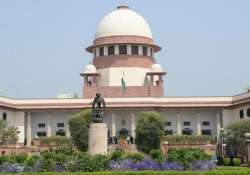Collegium likely to meet soon on appointing HC Chief Justices
New Delhi: After recommending extension of the tenure of 21 Additional Judges, the Supreme Court Collegium is likely to take a call on appointing regular Chief Justices in 8 high courts in the coming days.Sources

New Delhi: After recommending extension of the tenure of 21 Additional Judges, the Supreme Court Collegium is likely to take a call on appointing regular Chief Justices in 8 high courts in the coming days.
Sources in the know said the Collegium would meet in days to come to decide on appointing regular chief justices in the high courts of Andhra Pradesh/Telangana, Karnataka, Bombay, Gauhati, Gujarat, Patna, Punjab and Haryana and Rajasthan.
There was no system in place between April 13 and October 16 for appointment of judges to the Supreme Court and the 24 high courts. The National Judicial Appointments Commission Act and an accompanying Constitutional Amendment Act was notified on April 13, but it was declared as unconstitutional by the apex court on October 16.
When the NJAC Act was in force, the proposed panel had failed to function as Chief Justice of India Justice H L Dattu had refused to be a part of it.
Therefore, no judge could be elevated as Chief Justice of a high court, transferred to another high court or elevated to the Supreme Court.
The high courts of Gauhati, Gujarat, Karnataka, Patna, Punjab and Haryana, Rajasthan, besides the Andhra Pradesh and Telangana high court are at present headed by Acting Chief Justices.
Also Read: NJAC verdict: No conflict between govt and judiciary, says Arun Jaitley
Article 223 of the Constitution states that when the office of the Chief Justice of a high court is vacant or when any such Chief Justice is, by reason of absence or otherwise, unable to perform the duties of his office, the duties shall be performed by one of the other judges of the court as the President may appoint for the purpose.
Government had used this provision recently to appoint Acting Chief Justices in some high courts. In a landmark judgment on October 16, the apex court had struck down as unconstitutional the NJAC Act that was brought in to replace the over two-decade-old Collegium system of judges appointing judges in the higher judiciary. The judgment, that enabled the Collegium system to continue, also declared as unconstitutional the 99th amendment to the Constitution which allowed the NJAC to come into being.